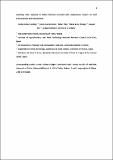Por favor, use este identificador para citar o enlazar a este item:
http://hdl.handle.net/10261/204150COMPARTIR / EXPORTAR:
 SHARE SHARE
 CORE
BASE CORE
BASE
|
|
| Visualizar otros formatos: MARC | Dublin Core | RDF | ORE | MODS | METS | DIDL | DATACITE | |

| Título: | Mice exposed to infant formula enriched with polyamines: impact on host transcriptome and microbiome |
Autor: | Gómez Gallego, Carlos; García Romo, María; Frías, Rafael; Periago, María Jesús; Ros, Gaspar; Salminen, Seppo; Collado, María Carmen CSIC ORCID | Fecha de publicación: | 3-mar-2017 | Editor: | Royal Society of Chemistry (UK) | Citación: | Food and Function 8 (4): 1622-1626 (2017) | Resumen: | Previous studies using a BALB/cOlaHsd model have shown the impact that the supplementation of infant formula with polyamines has on the modulation of microbial colonization and immune system development. To contribute to deciphering and identifying new complex interactions underlying the host response to polyamines, a systems biology approach integrating data from microbiota along the gastrointestinal tract, lymphocyte populations and immune system gene expression analysis of a lactating mice model fed different diets was carried out. The study design included four different dietary regimens including the following: mice fed by normal lactation; early weaned mice given commercial infant formula; and early weaned mice fed with infant formula enriched with two different concentrations of polyamines. Cluster analysis by principal component analysis and heat map demonstrated that the bacterial communities and immune system status differed between groups. The assessment of the relationship between immune system development, microbiota succession and polyamine supplementation in a global manner proved that the supplementation of infant formula with polyamines promotes similar microbial communities along the whole gastrointestinal tract, and results in similar lymphocyte populations and expression of immune related-genes to those with the normal lactated milk and the results differ from those with the infant formula without polyamines. Further studies should be conducted in human subjects to verify the current results, as the supplementation of polyamines may resemble the effect of natural breastfeeding practices in the gastrointestinal microbiota and immune system development in a mouse model. | Versión del editor: | https://doi.org/10.1039/C7FO00073A | URI: | http://hdl.handle.net/10261/204150 | DOI: | 10.1039/C7FO00073A | ISSN: | 2042-6496 |
| Aparece en las colecciones: | (IATA) Artículos |
Ficheros en este ítem:
| Fichero | Descripción | Tamaño | Formato | |
|---|---|---|---|---|
| FoodFunction2017-Gomez-Gallego.pdf | Artículo principal | 877,47 kB | Adobe PDF |  Visualizar/Abrir |
CORE Recommender
WEB OF SCIENCETM
Citations
9
checked on 24-feb-2024
Page view(s)
116
checked on 23-abr-2024
Download(s)
287
checked on 23-abr-2024
Google ScholarTM
Check
Altmetric
Altmetric
NOTA: Los ítems de Digital.CSIC están protegidos por copyright, con todos los derechos reservados, a menos que se indique lo contrario.
